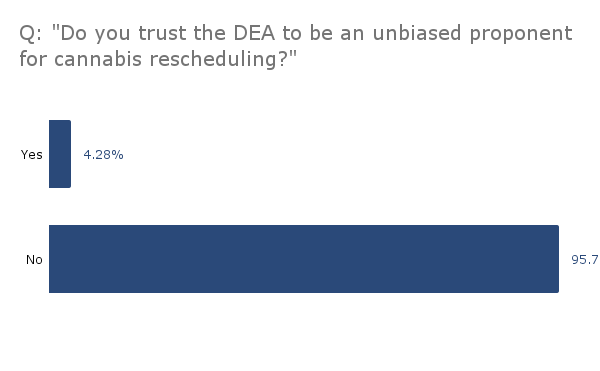The Drug Enforcement Administration (DEA) is supposed to be defending a marijuana rescheduling proposal that’s currently under review, but most cannabis consumers don’t trust the agency to do so, according to a new poll.
In fact, more than 9 in 10 people who use marijuana share that skepticism.
A survey from the cannabis telehealth platform NuggMD that was shared exclusively with Marijuana Moment this week found that an overwhelming 96 percent of people who consume cannabis said they don’t trust DEA to serve as an “unbiased proponent” of the Biden administration-initiated proposal to move cannabis from Schedule I to Schedule III of the Controlled Substances Act (CSA).
Just 4 percent of marijuana consumers said they trusted DEA to advocate for the reform, as the agency is meant to do as part of this rulemaking process.

Via NuggMD.
That’s according to the poll of 677 people who use cannabis, which was conducted from January 16-19. The margin of error was 3.7 percent.
“It’s pretty simple. Cannabis consumers are the people most directly affected by federal cannabis prohibition, and the DEA has the power to enforce those laws,” Andrew Graham, head of communications at NuggMD, told Marijuana Moment.
“When an agency you oversee polls at 4 percent with one of your stakeholder groups, you either have a policy problem, a personnel problem, or both,” he said. “The current administration needs to choose which problem it has before it can solve it.”
The question of DEA’s position on the rescheduling proposal has been on the minds of advocates and stakeholders for months. And despite the issue being raised in DEA’s own court that’s responsible for overseeing administrative hearings on the reform, the agency has consistently declined to clarify its position.
Part of the skepticism comes from DEA’s historical resistance to amending the CSA with respect to cannabis. And it didn’t help assuage concerns about bias when it was alleged during the rescheduling process that DEA unlawfully communicated and conspired with anti-rescheduling witnesses.
Also, breaking with precedent, former DEA Administrator Anne Milgram was not the one who signed off on the Justice Department’s rescheduling proposal. In this case, the rule was signed by then-Attorney General Merrick Garland.
For now, the DEA hearings on the reform are postponed after Administrative Law Judge (ALJ) John Mulrooney granted pro-rescheduling participants a leave to file an appeal in light of allegations about the agency’s role in the process. But what comes next is uncertain, especially considering that President Donald Trump has yet to formally nominate someone to lead the agency on a permanent basis.
If the recently selected acting administrator is chosen to occupy that seat and gets confirmed, however, that could pose problems for advocates. Derek Maltz, who retired from the agency in 2014 after 28 years of service, was recently named to lead DEA on an interim basis—and he’s previously linked cannabis use to school shootings and insisted that DOJ ”hijacked” the rescheduling process from the agency for political purposes.
Maltz also subscribes to the “gateway drug” theory for marijuana and believes most people living in states that have legalized cannabis will continue to obtain it from illicit sources such as cartels due to high taxes in regulated markets.
The announcement that Maltz will be serving as acting administrator comes as another former agency official, Jack Riley, says he’s being courted to potentially lead DEA under the newly inaugurated Trump administration. Riley has also previously described marijuana as a “gateway drug.”
Trump initially chose Hillsborough County, Florida Sheriff Chad Chronister to lead DEA, but the prospective nominee—who strongly advocated for marijuana decriminalization—withdrew from consideration last month amid scrutiny from conservative lawmakers over the sheriff’s record on COVID-related public safety enforcement actions.
Meanwhile, Trump’s choice for U.S. attorney general, former Florida Attorney General Pam Bondi (R), is declining to say how she plans to navigate key marijuana policy issues—including the ongoing rescheduling process and renewing federal enforcement guidance—if she’s ultimately confirmed.
The post 96% Of Marijuana Consumers Say DEA Is Biased Against Rescheduling Proposal It’s Supposed To Defend, Poll Shows appeared first on Marijuana Moment.